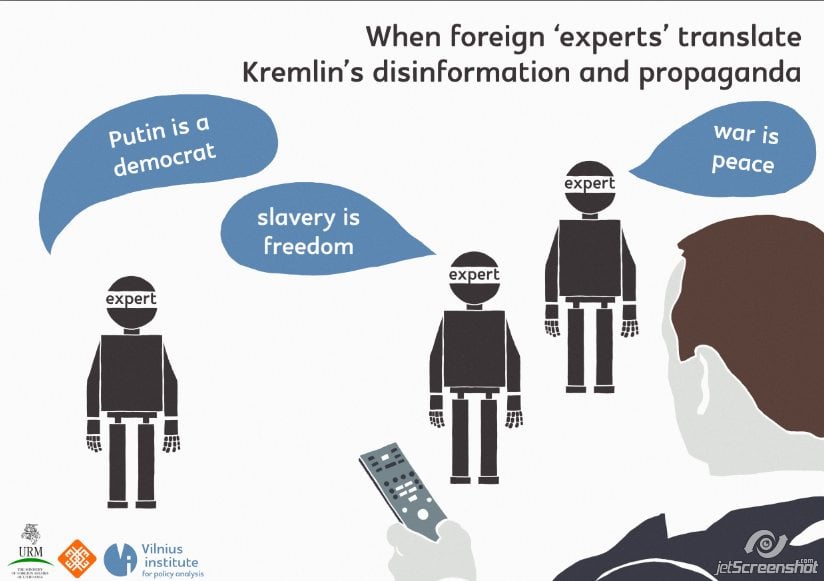
It is vital for Kremlin’s representatives to convince the West that the disinformation spread by them is not just a position taken by Moscow and its selected experts. In order to do that, it is necessary to find the right persons that have or have previously had a high status in a Western country some time ago. In this way they are seeking to send the message that says: “It is not only us who think this way. Look, they themselves are talking about that.”
One of these characters who serve under Kremlin is a former member of the US House of Representatives who has been a candidate in presidential elections – Ron Paul. After Donald Trump and Vladimir Putin’s meeting in Helsinki, he repeated the clichés dear to Vladimir Putin’s regime on a Kremlin’s mouthpiece RT:
- Paul called D. Trump and V. Putin’s meeting a positive step and an impetus in the bilateral relations and expressed an expectation to discuss the abolition of the US sanctions on Russia. In this context R. Paul does not even mention why those sanctions were lifted in the first place. The author does not talk about Kremlin’s aggression in Ukraine and puts all the blame on Washington. In this way R. Paul serves Kremlin’s propaganda, which seeks to reverse the roles of an aggressor and a victim when the former becomes the latter, and the victim is turned into a criminal. Kremlin’s propaganda that is being transmitted through these “experts” seeks to create an Orwellian world where the lines that show what is what are blurred, where the key concepts are left with the content that is filtered or are even reconstructed in a way that slavery becomes freedom and war begins to mean peace.
- Paul writes that the US media is a “big problem” because “they’re almost unanimously endorsing the idea that we have to have an enemy, and at this point – especially for the last 20 years – they’ve been working very hard to make Russia the enemy.” The author tries to argue that the tension between Washington and Moscow is not a result of an aggressive Russian foreign policy, which violates territorial sovereignty of neighboring countries, supports dictatorial regimes, and brutally violates human rights, but is simply the result of the US media propaganda. Thus, it is insinuated that Kremlin is not guilty of anything and all the blame rests with the Western media. This kind of rhetoric is dangerous not only because it seeks to place responsibility on Washington rather than Kremlin, but it also seeks to discredit free and independent media.
- When asked why the US media seems angry about Trump and Putin’s meeting, R. Paul explained that the US is actually governed by “a secret government that likes to control things and most people know what we talk about when we talk about the ‘deep state’”. According to R. Paul, members of this secret government have infiltrated into all parties and the media and they really hate Trump’s independence. Such statements bring to mind the idea expressed by Ivan Krastev that in today’s politics efforts to mobilize citizens are not based on ideology or party programmes, but rather on conspiracy theories. This is very dangerous as in this way rational, reasonable discussion and argumentation are eliminated from the political field, and everything becomes the question of believing or not believing. Those who talk about “the secret government” do not actually seek to prove that it exists: they only appeal to their listeners’ prejudices and grievances.
- When asked about the accusations against twelve Russian intelligence operatives for interference in the 2016 US presidential elections, R. Paul was quick to explain that this is “an argument why Russia is an enemy and we have to quit talking about them”. In his telling, “it’s just a propaganda stunt and not seeking justice”. R. Paul’s stance is a wilful creation of conspiracy in order to devalue rational discussion, which would have to revolve around the available public evidence. This is not only an attempt to defend the accusations for Russia, but also a conscious endeavor to boost citizens’ mistrust in the US legal system. R. Paul sends the message: “If you thought that the Russian legal system is awful, look at what’s happening in the US where justice is exploited in propaganda wars.” In R. Paul’s worldview, the US and Russia become morally equal, which downgrades the US and the legitimacy of liberal democracy in general, and masks the real evils perpetrated by the authoritarian regimes.
The public activity of such “experts” as R. Paul is not only an attempt to acquit Kremlin, but also to discredit the Western democracy. These talks are not yet another side we have to hear in order to fully understand, but simply an avalanche of disinformation, which seeks to destroy rational discussion, to spread the poison of conspiracy theories and to turn the media into a broadcaster of lies.
—
This publication is part of a project aimed at strengthening democracy and civil society as well as fostering closer ties with the EU Eastern Partnership countries (Ukraine, Moldova, Georgia) by spreading independent information with the help of contemporary solutions. The project is implemented by Vilnius Institute for Policy Analysis. It is financed as part of Lithuanian Ministry of Foreign Affairs’ Development Cooperation and Democracy Promotion Programme. #PackOfLies represents the position of Vilnius Institute for Policy Analysis only.




